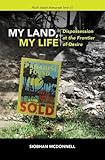My Land, My Life : Dispossession at the Frontier of Desire / Siobhan McDonnell; ed. by Tarcisius Kabutaulaka.
Material type: TextSeries: Pacific Islands Monographs Series ; 31Publisher: Honolulu : University of Hawaii Press, [2023]Copyright date: ©2023Description: 1 online resource : 14 b&w illustrations, 5 mapsContent type:
TextSeries: Pacific Islands Monographs Series ; 31Publisher: Honolulu : University of Hawaii Press, [2023]Copyright date: ©2023Description: 1 online resource : 14 b&w illustrations, 5 mapsContent type: - 9780824897192
- 333.0099595 23//eng/20230707eng
- online - DeGruyter
| Item type | Current library | Call number | URL | Status | Notes | Barcode | |
|---|---|---|---|---|---|---|---|
 eBook
eBook
|
Biblioteca "Angelicum" Pont. Univ. S.Tommaso d'Aquino Nuvola online | online - DeGruyter (Browse shelf(Opens below)) | Online access | Not for loan (Accesso limitato) | Accesso per gli utenti autorizzati / Access for authorized users | (dgr)9780824897192 |
Frontmatter -- Editor’s Note -- Contents -- Illustrations -- Acknowledgments -- Introduction: My Land, My Life -- 1. Reciprocity as a Fugitive Anthropologist -- 2. Weaving Narratives of Place -- 3. Performing Property, Throwing Silver Dollars -- 4. Custom Landownership a Frankenstein Corpse? -- 5. The Frontier of Desire -- 6. The Masters of Modernity -- 7. Mama Graon -- Conclusion: Refusal: Attempts to Decolonize Law -- Notes -- Glossary -- References -- Index -- About the Author
restricted access online access with authorization star
http://purl.org/coar/access_right/c_16ec
Throughout Oceania, land is central to identity because it is understood to be spiritually nourishing and sustaining. Land is the mother. Land, and the kinship it nurtures, is the basis for sustaining livelihoods and ways of life. Therefore, Indigenous dispossession from the land has deep and far-reaching consequences. My Land, My Life: Dispossession at the Frontier of Desire explores the land rush that took place in Vanuatu from 2001 to 2014 which resulted in over ten percent of all customary land being leased. In this book, Siobhan McDonnell offers new insights into the drivers of capitalist land transformations. Using multi-scalar and multi-sited ethnography, she describes not simply a linear march toward commodification of the landscape by foreign interests, but a complex web replete with the local powerful Indigenous men involved in manipulating power and property. McDonnell meticulously describes land-leasing processes and maps the relationships between investors, middlemen, and local men. She shows how property is a tool with which foreigners reassert capitalism and neocolonial control over Indigenous landscapes. The legal identity of “landowner” contains foundational contradictions between the rights established in Vanuatu’s kastom system and those afforded by property, as individualized rights over land. Property has also created sites for the production of masculine authority and enabled men to manipulate claims to land and entrench their personal power. This book explores how transactions of customary land have created new domains of agency and frontiers of desire: foreign desire to possess land and local desire to lease land for cash. It concludes with a discussion of Vanuatu’s constitutional and land reform package, drafted by the author, which took effect in 2014 and delivered a more empathetic approach to Indigenous land rights and ended the land rush.Informed by decades of study, legal work, and community engagement, My Land, My Life demonstrates an engaged anthropological practice based on reciprocity that responds directly to what Indigenous people have asked for. This book is certain to appeal to a wide range of scholars as well as policy makers.
Mode of access: Internet via World Wide Web.
In English.
Description based on online resource; title from PDF title page (publisher's Web site, viewed 02. Jun 2024)


